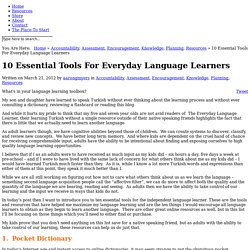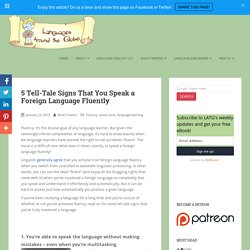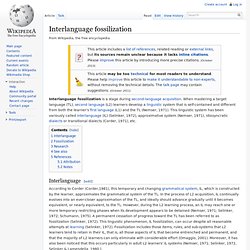

Fluent LandALSO – TOO – AS WELL – SO. Uk.businessinsider. Newsprint is on life support, emojis are multiplying faster than hungry Gremlins, and 300 million people worldwide strive to make their point in 140 or fewer characters.

People don’t have the time or the attention span to read any more words than necessary. You want your readers to hear you out, understand your message, and perhaps be entertained, right? Don’t Quit. Life is full of surprises.

We all know that of course, but there are times when each of us in our own way is taken off guard, is set back and knocked out of the comfortable routines and easy flow of the everyday of our lives. An illness crops up. A move to a new town, state or country occurs.There is a death in the family.A job is lost. A new job is begun.A child is born. In yet life moves on. Language Learning Tip: Opposites Activity. As a beginning language learner I was always looking for fun and interactive ways to engage with the language while out in the community here in Turkey.

Finding fun and time sensitive activities can open up new opportunities to speak the language and practice using what you are learning. Today I want to share a simple idea for practicing while with native speakers. It will probably be a simple five minute interaction but will force you to actively engage with the language. One fun way to practice your newly acquired vocabulary is through the process of thinking about and producing opposites. I say big. You can do this with anyone. 10 Essential Tools For Everyday Language Learners.
What's in your language learning toolbox?

My son and daughter have learned to speak Turkish without ever thinking about the learning process and without ever consulting a dictionary, reviewing a flashcard or reading this blog. And while it hurts my pride to think that my five and seven year olds are not avid readers of The Everyday Language Learner, their learning Turkish without a single resource outside of their native speaking friends highlights the fact that there is little that we actually need to learn another language. As adult learners though, we have cognitive abilities beyond those of children. We can create systems to discover, classify, and review new concepts. We have better long term memory. In today’s post then I want to introduce you to ten essential tools for the independent language learner. Five Reasons You Should Write as Part of Your Language Learning.
For the vast majority of language learners, myself included, we learn another language so that we can speak it.

We aren’t learning it so we can read the newspaper. We aren’t learning so that we can write letters to people. We may do both of these, and enjoy them as activities, but they are not the reason for our learning. Handcrafted audio for remembering what you learn. New English words in dictionary 2016. At the end of very year, the big book publishing houses tell us what they consider to be the 'Word of the year'.

This is a list of new words that will be entered into the English dictionary. The list contains new vocabulary that has become popular, widespread and fashionable in the previous year. The words have appeared on television, in movies, newspapers, social media and anywhere else that you can read or hear the English language. To be entered into the dictionary, the new words must have appeared several times in "reputable sources". So that means traditional newspapers, news programmes and radio: basically, if a word has been used by The BBC, then you can bet on it appearing in the next dictionary. :) The word that has appeared the most frequently is usually named as the 'word of the year'.
5 Signs That You Speak a Foreign language Fluently - LATG. Fluency: it’s the elusive goal of any language-learner.

But given the seemingly infinite complexities of language, it’s hard to know exactly when we language learners have earned the right to call ourselves “fluent”. How To Master Pronunciation Of A Foreign Language. Why even bother with studying pronunciation?

Well, as always, there are no easy answers. Some say it’s important to master pronunciation of a foreign language. Some say it’s a waste of time The question is – why should beginners and semi-advanced learners care? There are some obvious benefits – the better your pronunciation, the bigger a chance that native speakers will understand you. 7 Ways to Memorize a Language and Understand It. Posted on 08.

Oct, 2014 by meaghan in Language Learning We published a SlideShare earlier this month discussing “8 Mistakes that Haunt Language Learners”. One of these mistakes is worth a deeper look—the concept of memorizing what needs to be understood. It’s a big problem for anyone who wants to learn a language quickly, but more importantly sustain it over time and use it fluidly. So what, exactly, is the problem with memorizing versus understanding?
Image by Deb Stgo on Flickr.com. Interlanguage fossilization. Interlanguage fossilization is a stage during second-language acquisition.

When mastering a target language (TL), second language (L2) learners develop a linguistic system that is self-contained and different from both the learner’s first language (L1) and the TL (Nemser, 1971). This linguistic system has been variously called interlanguage (IL) (Selinker, 1972), approximative system (Nemser, 1971), idiosyncratic dialects or transitional dialects (Corder, 1971), etc. Interlanguage[edit] According to Corder (Corder,1981), this temporary and changing grammatical system, IL, which is constructed by the learner, approximates the grammatical system of the TL.
In the process of L2 acquisition, IL continually evolves into an ever-closer approximation of the TL, and ideally should advance gradually until it becomes equivalent, or nearly equivalent, to the TL. Fossilization[edit] Research[edit] See also[edit] Language transfer. 7 Ways to Memorize a Language and Understand It. Going Dutch: English words of Dutch origin. An extract from the Oxford Dictionary of Word Origins Is your boss a bit gruff? Maybe he is given to snooping–you probably wish he would go for a cruise on his yacht, maybe to the Netherlands, where all of these words come from.
The English and Dutch languages are closely related, and despite three 17th-century naval conflicts Britain and the Netherlands have long been connected. The ‘boss’ of all Dutch words is boss, which is from baas ‘master’. It started life in the USA at the beginning of the 19th century, and when it arrived in Britain was restricted to workmen’s slang. Booze is a Dutch word, and so are two of our most popular alcoholic drinks. Many words to do with the sea and sailing came the short distance across the North Sea to Britain, most of them in the 17th century.
Words for items of food that have entered the English language from Dutch include coleslaw, literally ‘cabbage salad’, cookie, and gherkin. “Watching TV helps me learn English.” #ThankfulThursday. Every #ThankfulThursday we speak to someone who is glad they learned English. This week we hear from Farrah – one of our Twitter followers from Valencia, Spain – who watches English-language TV shows to build on the basics she learned at school. Our recent global survey highlighted the many ways learners are perfecting their English outside of the classroom. We discovered that television programmes are a popular way to combine learning English with having fun. While the majority of our survey respondents were fans of House of Cards and Breaking Bad, Farrah prefers to learn English by watching shows such as Charmed, Buffy the Vampire Slayer and her new favourite, Supernatural. So, When Did We Start Introducing Sentences with So? Alli G. asks: Why do people today always start sentences with so?
The word so has been in English pretty much as long as there has been English (derived from the Old English swæ). It is alternately an adverb (it’s so hot), a conjunction (eat your dinner so you can have dessert), an adjective (Jim is dead, isn’t that so?) And an introductory particle (So, I heard gun shots last night).